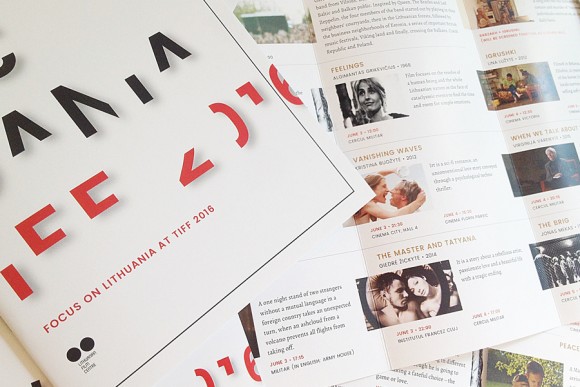The Lithuanian film programme consists of 13 works representing a variety of genres. Fans of documentaries will see Barzakh (directed by Mantas Kvedaravičius, 2011), Igrushki (directed by Lina Lužytė, 2012), Master and Tatyana (directed by Giedrė Žickytė, 2014), When We Talk About KGB (directed by Virginija Vareikytė, Maxi Dejoie, 2015), and Prison made by Jonas Mekas in 1964. The collection of Lithuanian feature films will include Gambler (directed by Ignas Jonynas, 2013), Vanishing Waves (directed by Kristina Buožytė, 2012), the Lithuanian and Finish co-production 2 Nights Till Morning which was shot in Vilnius (directed by Mikko Kuparinen, 2015), and the restored and digitised classical films The Beauty (directed by Arūnas Žebriūnas, 1969) and Feelings (directed by Alamntas Grikevičius and Algirdas Dausa, 1968). The films will be presented by the filmmakers Giedrė Žickytė, Virginija Vareikytė and Lina Lužytė, film critic Mantė Valiūnaitė, and actors Vytautas Kaniušonis and Jurga Jutaitė.
“We are glad that the organisers of the festival have shown interest in such a wide scope of the Lithuanian cinematography – from avant-garde pioneer Jonas Mekas to the works of Šarūnas Bartas and the most recent documentary and feature films,” said LianaRuokytė-Jonsson, Head of the Department of Film Promotion, Information and Heritage at the Lithuanian Film Centre. “This is the first such presentation of Lithuanian films in Romania ever. The interesting thing is that foreign audiences are equally interested in modern Lithuanian films as well as the works created during the Soviet occupation. Four films from the Lithuanian heritage of cinematography have been restored and digitised under the commission of the Lithuanian Film Centre – including the The Beauty and Feelings that will be screened at the Transylvanian Film Festival. We are happy that Lithuanian classics are appreciated and welcome at foreign festivals. It is important that we now have high-definition copies of several heritage films that we can offer to foreign audiences.”
The Lithuanian filmmaker Šarūnas Bartas will be the special focus of the festival – three of his films have been included in the programme of renowned filmmakers “3x3”. The audience will have an opportunity to see Few of Us (1996), Freedom (2000), and his latest work Peace to Us in Our Dreams (2015). Bartas will also show up to meet the viewers together with the young actress Ina Marija Bartaitė.
“I got acquainted with Lithuania and its cinematography several years ago, when I visited the local film festival “Kino pavasaris”,” said Mihai Chirilov, the programmer of the Transylvanian film festival. “I saw a number of Lithuanian films and met local film industry professionals. I believe the Lithuanian films that have been created during the past five years and included in our programme are a good representation of the Lithuanian film industry revealing its uniqueness and versatility, modern-day atmosphere and respectable past, artistic innovations and social-historical heritage. Such excellent and bold films like Gambler and Vanishing Waves are in perfect alignment with the spirit of our festival, while the film When We Talk About KGB will be accepted here like nowhere else given the shared past of our nations.”
Bilateral collaboration between Lithuania and Romania is important not only in terms of promoting the country, but also in terms of international networking in order to undertake joint projects with a strong and respected film industry in the global context. The first Romanian-Lithuanian co-production Eastern Business (directed by Igor Cobileanski and produced by Dagnė Vildžiūnaitė) will be premiered in the competition programme “Romanian Days”. There are hopes to boost the number of joint projects in the future.
Beside the special focus programme, the festival will have other Lithuanian tones too. The film critic Edvinas Pukšta has been asked to join the jury of the “Romanian Days” to cast his vote on Romanian short films, while the Lithuanian band of cinematographic rock Garbanotas Bosistas will put on a show in the festival’s prestigious musical section.
The Lithuanian Film Centre (LFC) has published a print for the Transylvanian Film Festival featuring all of the works selected for the programme and their authors. The digital version of the publication can be downloaded from the LFC website.
The showcase of the Lithuanian cinematography has been organised and supported by the LFC together with the Transylvanian Film Festival.
The Transylvanian Film Festival is the first and one of the biggest international film festivals in Romania. It has been included in the top 40 most important film events across the world.
The festival will end on June 5.




















